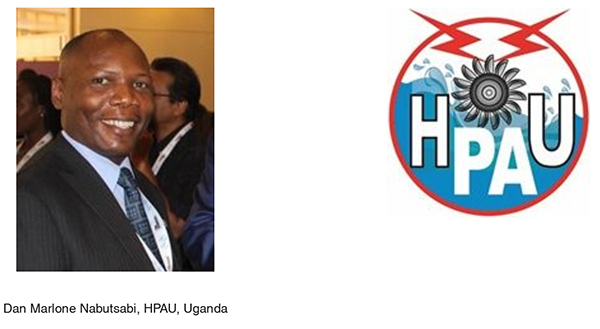Views on the hydropower sector from an African perspective

HYPOSO:
Please tell us about the background of your organisation and your role in the HYPOSO project.
D. M. Nabutsabi:
"Hydro Power Association of Uganda (HPAU) Ltd. is a not-for-profit organisation, formed and duly incorporated in Uganda on June 10th, 2014, as a company limited by guarantee. HPAU seeks to contribute to the national, regional and global development and sound management of hydropower resources for sustainable access to energy for improved socio-economic progress. It has over 20 corporate developers, operators, equipment dealers and consultants, among others.
Currently, HPAU is one of the consortium members and also the implementing partner for the HYPOSO (Hydro Power Solutions for developing and emerging countries) Project in Uganda. Uganda is one of the five target countries of the three-year HYPOSO Project, funded by the Innovation and Networks Executive Agency of the European Commission, under Horizon 2020 Research and Innovation Framework."
HYPOSO:
Can you tell us a little bit about Uganda and the energy situation in the country?
D. M. Nabutsabi:
"According to Electricity Regulatory Authority (ERA), the last 20 years have registered various positive strides in the energy sector. Among them is the generation capacity, which grew from 404.4 MW to 1,252.3 MW while the number of generation plants increased from 4 to 44. Besides, Uganda moved away from sole dependence on hydro and diversified to solar, thermal, co-generation and biomass. Nevertheless, hydro still dominates, contributing to 80 % of the entire energy mix. About 143 MW of this is from 20 operational small hydro plants.
However, in spite of the 12 % average annual growth rate (2018/19), Uganda’s per capita energy consumption of 215 kWh is still lower than the Sub-Sahara average of 552 kWh, while the national electrification rate only recently hit 50 %."
HYPOSO:
Can you briefly inform about the role of hydropower, with a dedicated view to small hydropower, in Uganda?
D. M. Nabutsabi:
"In Uganda, small hydro power refers to plants with installed capacity of up to 20 MW. By 2019, there were about 20 operational SHPs with total installed capacity of 145.3MW. Most of these were developed by independent power producers; given the existing conducive policy and regulatory frameworks. Out of a national potential of about 400 MW, over 50 sites totaling to 210 MW have been identified. Developing a small hydro power plant in Uganda is estimated to cost between USD 3 m and 4 m per Megawatt installed."
HYPOSO:
Where do you see special needs for changes in the framework to foster the (small) hydropower sector in your country?
D. M. Nabutsabi:
"So far, the policy and regulatory framework, including the GET FiT and Standardised Power Purchase Agreements offered by the government have greatly encouraged the exploitation of small hydro power in Uganda. Unfortunately, the nation needs to establish a one-stop centre for data and information pertaining to the sector. This will greatly help potential investors and developers take quick informed decisions pertaining to small hydro projects development."
HYPOSO:
What do you expect to achieve together with the HYPOSO project partners in Uganda?
D. M. Nabutsabi:
"We, as HPAU, envisage that by the time the HYPOSO project comes to an end, some of our key stakeholders (especially developers) shall have got appropriate solutions to barriers that previously hampered them from speedy, affordable and quality development of their sites, through networking with stakeholders (manufacturers, exporters and suppliers of equipment and technology) from Europe."
HYOPOSO:
If you could wish one thing for the hydropower sector, what would it be?
D. M. Nabutsabi:
"I would still reiterate the need to have a centralised and easily accessible database for the sector; with which investment and exploitation will be much easier and streamlined."
HYPOSO:
Thank you for the insights and good luck for the future activities.
